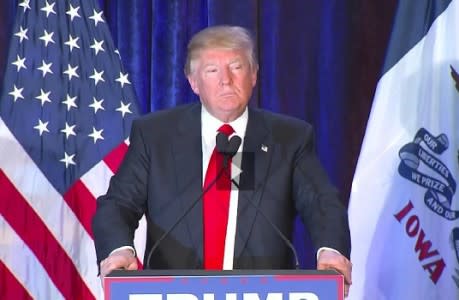Another rough night for the pollsters in Iowa
In the end, the biggest loser in the Iowa caucuses might not be the campaigns of several presidential hopefuls, but the public perception of polling organizations that were again off the mark.
Pollsters in general took a lot of criticism after the 2012 presidential election, where a variety of surveys made the race between Barack Obama and Mitt Romney much closer than it actually was. Four years later, two major polling groups – Gallup and Pew – passed on doing traditional “horse race” polls that predicted head-to-head election outcomes. And heading into Iowa, GOP contender Donald Trump and former Secretary of State Hillary Clinton were projected to win the respective Iowa caucuses.
Instead, Ted Cruz took the GOP race, while Clinton and Bernie Sanders finished in a virtual dead heat for the Democrats. And on Tuesday, the pollsters faced more scrutiny after the Iowa results were in.
Here’s a typical headline (from Bloomberg): “Iowa’s Other Losers: Polls That Showed Trump Ahead Before Caucus”
Real Clear Politics, a popular website that aggregates election polls and content, showed Trump with an average 4.7 percent lead over Cruz heading into Monday night, using the results of recent Iowa polls. The highly respected Des Moines Register poll had Trump up by 5 points as of Sunday.
However, Cruz had 28 percent of the vote as of Tuesday morning, with Trump at 24 percent, and Marco Rubio at 23 percent. The pollsters on average had expected Trump to get 28.6 percent, Cruz 24 percent and Rubio, 17 percent.
For the Democrats, the race between Clinton and Sanders had been forecast to be close. Although Clinton had a 4 percent average lead, heading into Monday night. Sanders had a 3 point lead in the last major poll, from Quinnipiac, heading into the caucus. As of Tuesday morning, Clinton had a 1 percent lead over Sanders.
The pollsters were already feeling the heat in the media on Tuesday morning. In an article for Politico, called “How Pollsters Got Iowa Wrong,” Steven Shepard explained some of the historic and functional problems pollsters face.
For example, the gold standard of Iowa polling, the Des Moines Register poll, had to be completed to appear in a Sunday print newspaper, and it didn’t capture critical polling data right before the caucus. “That poll was conducted last Tuesday through Friday, meaning it also may have missed any late movement,” Shepard said. It also mostly missed the effect of Trump’s absence from a debate.
The Iowa caucuses had a record turnout and entrances polls showed that as many as one-third of participants didn’t chose a candidate until the last few days of the race – after most pollsters had stopped polling. But even the Quinnipiac Poll, which used phone data up to the caucuses, had Trump up by 7 points and Sanders ahead by 3 points.
On Monday, election expert Nate Silver explained why Iowa is hard to handle for pollsters.
“It’s what the data tells us. That data tells us that polling in general elections is pretty accurate, at least in the final few weeks before the election. The data also tells us that polling in primaries and caucuses is not very accurate,” Silver said, pointing to a typical error rate of 8 percent in primary polls.
Turnout and late decisions by voters are critical factors in primaries, he said, in a preview of what actually happened in Iowa. Silver’s Polls Plus forecast on Monday afternoon, which took additional factors into account, had Trump with a 46 percent chance of winning Iowa, with Cruz second at 39 percent.
His final word of warning was, “Keep an open mind about the results. And don’t be shocked if the polls are way off.”
The pollsters had their defenders on Tuesday morning. At Campaigns & Elections, Jacob Meschke did a round-up of pollsters who defended other pollsters and explained the problems unique to Iowa. “The fluid nature of the process, and the large number of voters who make their final decisions in the 48 hours before they caucus makes it tough for even the best polls to nail the final results,” he said.
The pollsters all agreed that high turnout levels in the primaries will make all the races less predictable.
Scott Bomboy is the editor in chief of the National Constitution Center.
Recent Election Stories on Constitution Daily
Why it’s tough to win New Hampshire and Iowa in contested years
Why Iowa and New Hampshire go first
Who wins in the Iowa Caucuses? Not always the eventual nominee


